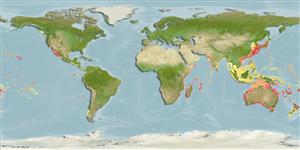>
Lampriformes (Velifers, tube-eyes and ribbonfishes) >
Veliferidae (Velifers)
Etymology: Metavelifer: Greek, meta = with, after + latin, vela = sail + Latin, fero = to carry (Ref. 45335).
More on author: Regan.
Environment: milieu / climate zone / depth range / distribution range
Ecologie
marien benthopelagisch; diepte 40 - 240 m (Ref. 9563). Temperate
Indo-Pacific: off Maputo in Mozambique; also from Australia, New Zealand and Hawaii. Reported from Japan (Ref. 559).
Grootte / Gewicht / Leeftijd
Maturity: Lm ? range ? - ? cm
Max length : 28.0 cm TL mannelijk / geslacht onbekend; (Ref. 6618)
Dorsale stekels (totaal) : 21 - 22; Dorsale zachte stralen (totaal) : 20 - 23; Anale stekels: 17 - 18; Anale zachte stralen: 16 - 18.
A benthic species (Ref. 75154) found on the continental shelf (Ref. 9563, 75154) and slope (Ref. 559); also on seamounts (Ref. 559).
Levenscyclus en paargedrag
Maturiteit | Voortplanting | Paaien | Eieren | Fecunditeit | Larven
Heemstra, P.C., 1986. Veliferidae. p. 398-399. In M.M. Smith and P.C. Heemstra (eds.) Smiths' sea fishes. Springer-Verlag, Berlin. (Ref. 6618)
Status op de Rode Lijst van het IUCN (Ref. 130435: Version 2024-1)
Gevaar voor de mens
Harmless
Gebruik door de mens
Tools
Speciale rapporten
Download XML
Internetbronnen
Estimates based on models
Preferred temperature (Ref.
123201): 13.9 - 25, mean 17.6 °C (based on 189 cells).
Fylogenetische diversiteitsindex (Ref.
82804): PD
50 = 1.2500 [Uniqueness, from 0.5 = low to 2.0 = high].
Bayesian length-weight: a=0.01995 (0.00906 - 0.04395), b=3.01 (2.83 - 3.19), in cm total length, based on all LWR estimates for this body shape (Ref.
93245).
Trofisch niveau (Ref.
69278): 3.6 ±0.6 se; based on size and trophs of closest relatives
Fishing Vulnerability (Ref.
59153): Low vulnerability (18 of 100).
